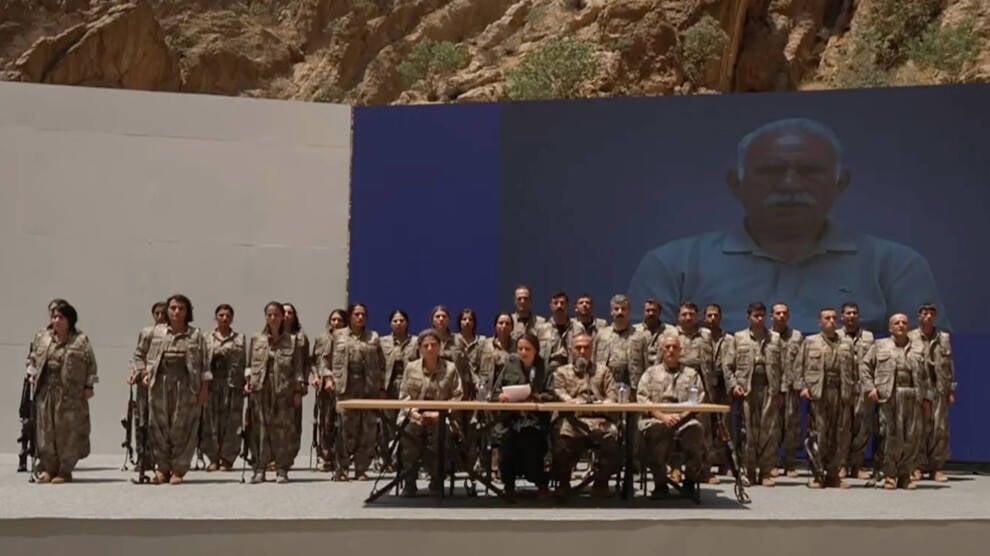In a historic statement, members of the “Group for Peace and Democratic Society” have made a significant gesture in the ongoing struggle for rights and recognition of the Kurdish people. Following a long history of conflict, the group announced their decision to voluntarily disarm as a step toward fostering peace and democratic processes. This move is a response to calls from Kurdish People’s Leader, Abdullah Öcalan, emphasizing the need for political solutions over armed struggle. The group aims to shift its focus to legal and democratic politics to secure greater rights and freedoms for the Kurdish population and promote solidarity across Turkey and the Middle East.
| Article Subheadings |
|---|
| 1) Background of the Group for Peace and Democratic Society |
| 2) The Importance of Disarmament |
| 3) Calls to Action for Global Solidarity |
| 4) The Role of Abdullah Öcalan in the Peace Process |
| 5) Future Prospects for Kurdish Rights and Democracy |
Background of the Group for Peace and Democratic Society
The “Group for Peace and Democratic Society” has been established to accelerate democratic change and transformation for the Kurdish people. This initiative includes various factions and individuals committed to advocating for the rights of the Kurds amidst persistent challenges. Formed in a turbulent environment marked by years of conflict and strife, the group aims to represent the aspirations and struggles of Kurdish communities across the region. As a response to systemic discrimination and historical grievances, the group takes on the role of peace advocates, intending to reshape dialogues around Kurdish identity in Turkey.
The Importance of Disarmament
Disarming is seen as a pivotal step in the journey toward peaceful coexistence and political engagement. In their statement, the group emphasized the significance of voluntarily laying down arms as a gesture of goodwill, symbolizing commitment to peace rather than conflict. This move is not simply about disarmament itself, but also reflects a broader strategy of transitioning from an armed struggle to one rooted in political advocacy and democratic rights. By dismantling their arsenal, the group seeks to inspire confidence among their communities and encourage various sectors of society to support the peace-taking endeavors.
Calls to Action for Global Solidarity
The members of the group have extended a powerful invitation to global allies, urging them to recognize the historic nature of their disarmament and to join their cause. They implored laborers, workers, intellectuals, and various community leaders to engage actively in fostering peace and advocating for the Kurdish right to self-determination. The aim is to build a coalition that transcends the regional conflict and mobilizes international support, thereby strengthening the resolve of the Kurdish people in their quest for recognition and rights. This call to action underscores the urgency and importance of collective solidarity and activism on all fronts.
The Role of Abdullah Öcalan in the Peace Process
The statement highlighted the significant influence of Abdullah Öcalan as a guiding figure for the movement. The group acknowledged his previous calls for peace and the adoption of a non-violent approach to political engagement. Öcalan’s vision for a democratic solution serves as a foundation for the group’s current efforts, promoting dialogue over conflict. His philosophy underscores the need to uphold human rights while advocating for political change, thus drawing attention to the necessity of a more inclusive democratic framework. By aligning their actions with Öcalan’s teachings, the group seeks to fortify their legitimacy and reinforce the notion that peace is attainable through collective understanding and dedication.
Future Prospects for Kurdish Rights and Democracy
Moving forward, the efforts of the “Group for Peace and Democratic Society” are centered on embedding democratic principles within the social fabric of Kurdistan and beyond. Their commitment to securing the political, social, and cultural rights of the Kurdish people stands as a testament to the potential for meaningful change. The outcome of their initiatives is contingent on both internal cohesion among Kurdish groups and the external political climate across Turkey and the larger Middle East. Should they successfully navigate these complexities, there is hope for a transition to a more just and equitable society. However, significant challenges remain, including responding to rising authoritarian sentiments and geopolitical tensions that continue to affect the region.
| No. | Key Points |
|---|---|
| 1 | The “Group for Peace and Democratic Society” is advocating for political solutions for the Kurdish people. |
| 2 | Their disarmament represents a commitment to peace rather than conflict. |
| 3 | Global solidarity is crucial for advancing the Kurdish cause and democratic rights. |
| 4 | Abdullah Öcalan’s philosophy is central to the group’s peace-building efforts. |
| 5 | The group aims to create a more just society through political advocacy. |
Summary
The actions undertaken by the “Group for Peace and Democratic Society” illuminate a critical juncture in the struggle for Kurdish rights and recognition. Through their disarmament, the group aspires to foster a paradigm shift toward peaceful political engagement. This historical movement aims to encourage solidarity among diverse demographic sectors while grounding their efforts in the philosophical teachings of Abdullah Öcalan. Moving forward, the group will face both opportunities and challenges as they navigate a complex political landscape. Ultimately, their commitment to peace and justice demonstrates a profound desire for meaningful change.
Frequently Asked Questions
Question: What led to the formation of the “Group for Peace and Democratic Society”?
The group was formed to advocate for the rights and recognition of the Kurdish people within a framework that promotes democratic change and transformation.
Question: Why is disarmament important for the group?
Disarmament symbolizes a commitment to peace and a transition from armed struggle to political advocacy for rights and recognition.
Question: How does the philosophy of Abdullah Öcalan influence the group’s mission?
Öcalan’s teachings emphasize the importance of political solutions and dialogue over violence, guiding the group’s current peace-building efforts.


